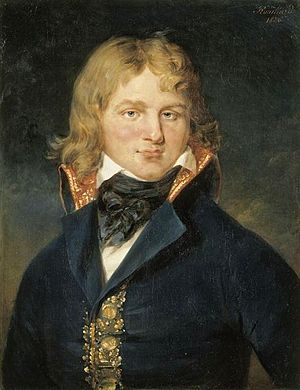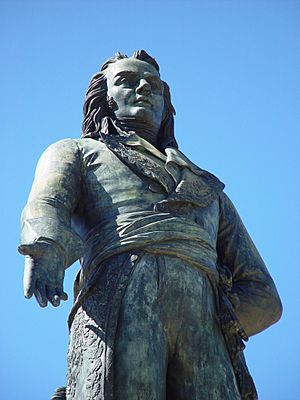Jean-Étienne Championnet facts for kids
Quick facts for kids
Jean-Étienne Championnet
|
|
|---|---|

General Jean-Étienne Championnet
|
|
| Born | 13 April 1762 Alixan, France |
| Died | January 9, 1800 (aged 37) Antibes, Alpes-Maritimes, France |
| Allegiance | |
| Service/ |
Infantry |
| Years of service | 1789–1800 |
| Rank | General of Division |
| Battles/wars |
|
Jean-Étienne Vachier Championnet, known as Championnet (born April 13, 1762, in Alixan, Drôme – died January 9, 1800), was an important French general. He led French armies during the French Revolutionary Wars. He became the main commander of the Army of Rome in 1798. Later, in 1799, he took charge of the Army of Italy. Sadly, he died in early 1800 from a serious illness called typhus. His name is honored on the names inscribed under the Arc de Triomphe in Paris.
Championnet's Military Journey

Jean-Étienne Championnet joined the army when he was quite young. He served in the Great Siege of Gibraltar, a long military event.
When the French Revolution began, he played a big part in the changes. His fellow soldiers chose him to be their commander. In May 1793, he was asked to stop civil unrest in an area called the Jura. He managed to do this peacefully, without any fighting.
Under General Jean-Charles Pichegru, Championnet fought in the Rhine campaign of 1793. He was a brigade commander, leading a group of soldiers. His bravery in battles at Weissenburg and in the Palatinate region earned him praise from General Lazare Hoche.
Key Battles and Commands
At the Battle of Fleurus, Championnet's strong fighting in the middle of the battlefield helped General Jean-Baptiste Jourdan win a major victory. In the wars that followed, Championnet commanded the left side of the French armies. These armies were fighting along the Rhine river. He also took part in military trips to the Lahn and Main rivers. For a short time, from January 24 to January 31, 1797, he led the Army of Sambre and Meuse.
In 1798, Championnet became the main commander of the Armée de Rome. This army was protecting the new Roman Republic from attacks. The Neapolitan court and the British fleet were trying to overthrow it. Even though his army was small and lacked supplies, Championnet held his ground. He even managed to capture the city of Naples. There, he helped set up the Parthenopaean Republic, a new government.
Championnet was a very serious leader and didn't like it when people disagreed with him. He also faced problems because his troops sometimes took things from people. This caused trouble with the local population. He got into an argument with a political official named Guillaume-Charles Faipoult. Because of this, Championnet was removed from his command and even spent a short time in prison.
Later Campaigns and Death
However, the next year, Championnet was back in action. He was made commander-in-chief of the Army of the Alps. At first, this army was not ready for battle. But after three months of hard work, Championnet got it ready to fight.
After General Barthélemy Catherine Joubert was killed at the Battle of Novi, Championnet took over command of the Army of Italy. The battles that followed were not successful for the French. Championnet became exhausted from the difficult fighting. He died at Antibes in the French Maritime Alps in January 1800.
In 1848, a statue was built in his honor in Valence. Napoleon himself once said that Championnet "was brave, full of zeal, active, devoted to his country." Napoleon thought he was a good general for a division, but not as strong as a main commander.
Championnet is also linked to a traditional carnival in Frosinone, Italy. This city was once part of the short-lived Parthenopaean Republic that Championnet helped create. During the carnival, a puppet representing the general is carried through the streets and then burned.
See also
 In Spanish: Jean Étienne Vachier Championnet para niños
In Spanish: Jean Étienne Vachier Championnet para niños
 | Victor J. Glover |
 | Yvonne Cagle |
 | Jeanette Epps |
 | Bernard A. Harris Jr. |

